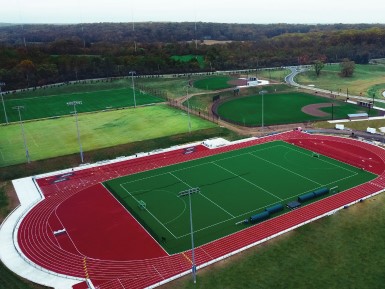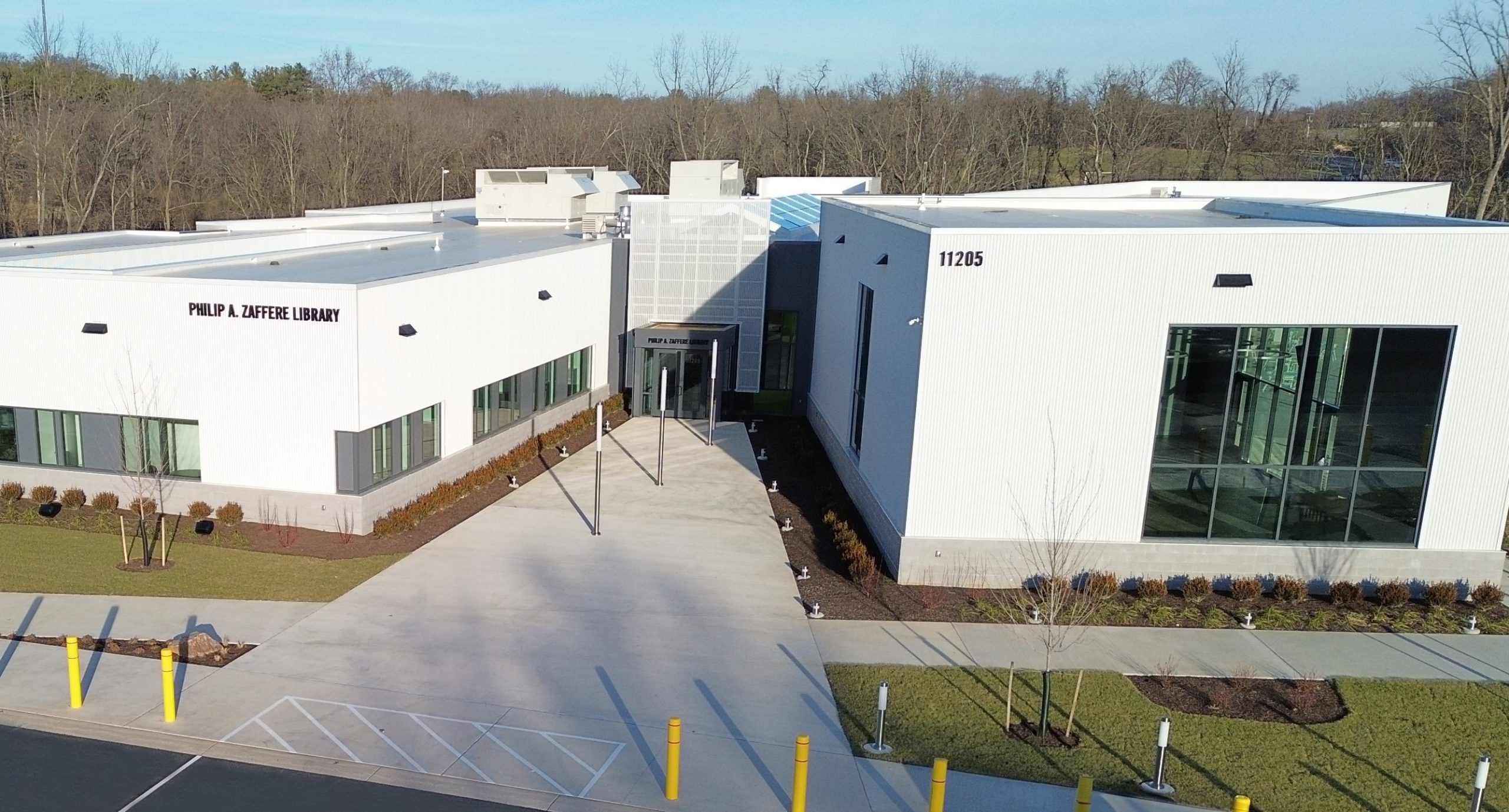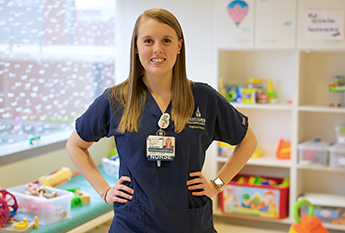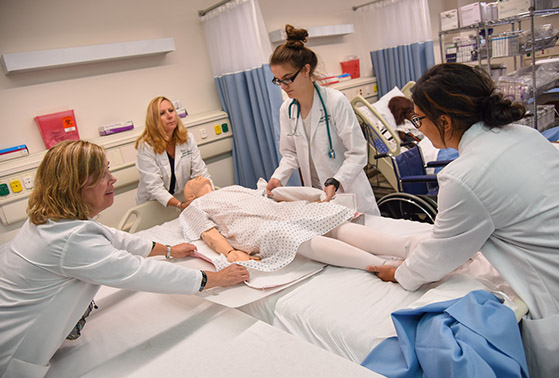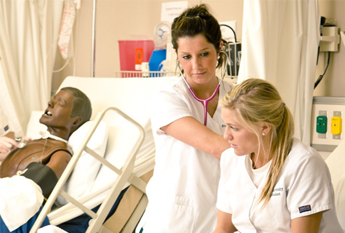Pursue your Passion to Give Back
BACHELOR OF SCIENCE
For more than 30 years, Stevenson’s Bachelor of Science in Nursing program has been preparing students to pursue their passions, achieve their career goals, and help those in need. The program trains students to take on the critical and expanding role of a nurse in today’s healthcare system, while emphasizing the ethics of care, critical thinking, and fostering a spirit of inquiry in education, practice, service, and research.
Our nursing program is direct admission—once you are accepted to Stevenson you are also accepted to our nursing program. Unlike programs at other schools, you do not have to take years of coursework to apply to our nursing program. At Stevenson, you enter the nursing program upon admission, so you can start receiving program-specific guidance and continuity from your first semester.
Small classes and clinical groups afford rich opportunities to build one-on-one professional mentoring relationships with Stevenson’s experienced nursing faculty. Beginning in your third year, clinical nursing courses will allow you to engage with real-life healthcare issues. Through our partnerships with leading regional healthcare systems and local hospitals, you will gain valuable first-hand clinical experience in community settings.
Learn more about Additional Requirements for Transfer and Second Bachelor’s Students
Graduates of the Nursing program will:
- Integrate the concepts of caring in nursing practice in diverse health care settings across the health-illness continuum.
- Engage in holistic reflective nursing practice informed by the arts, sciences, and humanities.
- Exhibit competencies in critical thinking, communication, evidence-based decision making, scholarly inquiry and technical skills in the practice of nursing.
- Integrate professional competencies in the nursing roles of provider, designer, manager, and coordinator of care and participate as an active member of the profession.
- Assume ethical and legal responsibility and accountability in nursing practice, exemplifying the values of altruism, autonomy, human dignity, integrity, and social justice.
- Apply leadership concepts, skills, and decision-making in creating caring environments to promote health and healing in individuals, families, communities, and global populations.
Exceptional Experiences: Susannah Lehr
As a nursing student, service scholar, and student-athlete, Susannah truly takes advantage of all the university offers to it’s students.
Accredited Nursing Programs

The baccalaureate degree program in nursing and the master’s degree program in nursing at ������ýֱ�� are accredited by the . The baccalaureate degree program in nursing at ������ýֱ�� is approved by the . Upon successful completion of all degree requirements, you are eligible to sit for the National Council Licensure Examination (NCLEX-RN) to become a registered nurse.
Stevenson Nursing
Career Connections
Internship Placements
- MedStar Health
- Anne Arundel Medical Center
- GBMC
- Johns Hopkins Hospital
- Mount Washington Pediatric Hospital
- University of Maryland Medical Center
Top Employers
- MedStar Health
- GBMC
- Harford Memorial
Hospital - Lifebridge
- St. Joseph’s Hospital
- University of Maryland Medical Center
Graduate Opportunities
- Georgetown University
- New York Medical College
- ������ýֱ��
- University of Maryland School of Nursing
- University of Pennsylvania
Career Pathways
- Cardiovascular
- Health Education Promotion
- Neonatal Care
- Psychiatric-Mental Health
- Rehabilitation
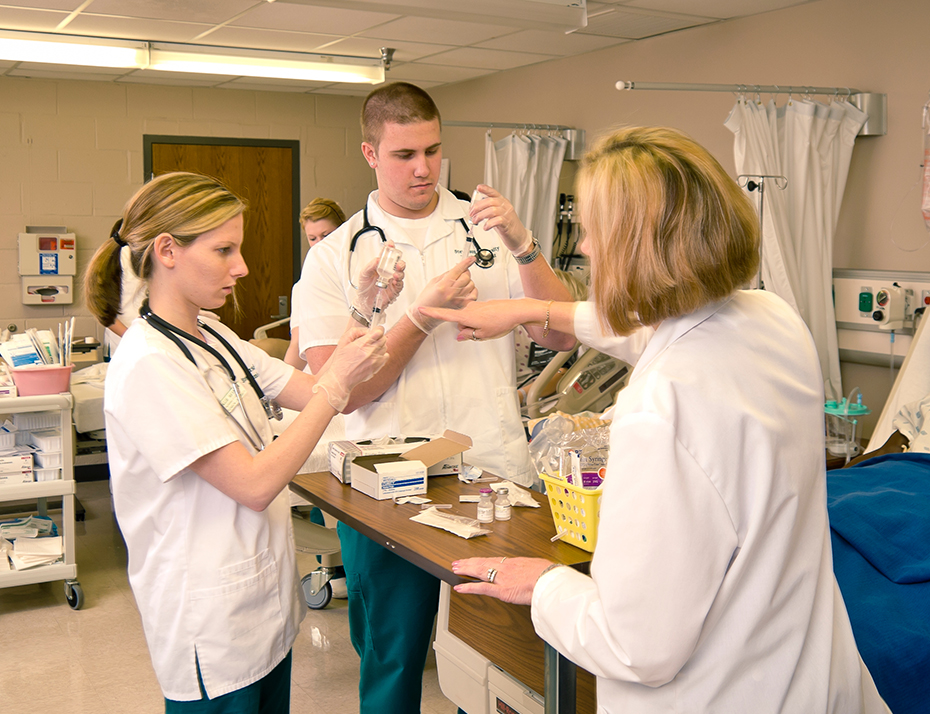
A Closer Look at Nursing
Transfer students seeking either their first or second bachelor’s degree in nursing are invited to attend an information session to learn more about Stevenson’s nursing program. Representatives from the Nursing Department and Admissions Office will be available to discuss the Bachelor of Science degree with students wishing to become a nurse.
Study Nursing at Stevenson
Courses and Clinical Requirements
The courses in the preview below are required for completion of the bachelor’s degree in Nursing. Students must complete all remaining major requirements in addition to the Stevenson Educational Experience (SEE) courses.
Course Preview
| BIO 113 | General Biology I: Cell Biology and Genetics | 3 credits |
| BIO 222 | Human Anatomy | 4 credits |
| NURS 110 | Computer Technology in Nursing | 3 credits |
| NURS 240 | Nutrition | 3 credits |
| NURS 337 | Psychiatric and Mental Health Nursing | 4 credits |
| NURS 360 | Medical/Surgical Nursing I | 4 credits |
| NURS 437 | Introduction to Nursing Research | 3 credits |
Bachelor’s to Master’s Option
BS/MS options are available for students majoring in Nursing who wish to combine their bachelor’s coursework while working toward a ������ýֱ�� Master’s Degree in one of the following:
*Graduate Nursing is not eligible
Explore more Bachelor’s to Master’s Options
Clinical Requirements
Placement into the third- and fourth-year clinical experiences at hospitals and other sites requires the completion and documentation of several medical and placement-specific requirements. Some requirements must be fulfilled prior to the start of the third-year clinical experiences while others must be fulfilled annually prior to the start of classes in the third and fourth years of the nursing program. A summary of these requirements are below. Detailed descriptions of all requirements and the accepted documentation are included in the School of Nursing and Health Professions Student Policy Manual on the SU portal. NOTE: Medical and clinical requirements are subject to change and students should refer to the portal page for the School of Nursing and Health Professions for the most up to date requirements.
One-time Requirements:
- Physical Examination (within one year of starting third-year clinical courses)
- Required Vaccinations – Tdap, Varicella, Measles, Mumps, and Rubella (MMR), Hepatitis B (HepB)
- Fingerprinting (prior to enrollment in )
Annual Requirements:
- Proof of Health Insurance
- CPR Certification – certification must be in the American Heart Association Basic Life Support for Health Care Providers course and must be current for the entire academic year
- Tuberculosis Screen Test
- Seasonal Influenza (Flu) Vaccine
- Background Check and Drug Screen
- Dosage Exam – Score of 100% required in fall and spring of each year in clinical courses
- Clinical Site-Specific Documentation
It is the student’s responsibility to ensure that all medical and clinical requirements are met as described using the procedures and deadlines published in the School of Nursing and Health Professions Student Policy Manual. Failure to provide acceptable documentation of medical requirements and/or clinical site-specific documentation by the established deadlines may result in a student being ineligible to begin any clinical experience.
Academic Catalog
Explore our academic catalog for a full listing of courses, course descriptions, and suggested course sequence for Stevenson’s Nursing program.
| First Year Seminar | 1 credit | |
| Principles of General Biology | 3 credits | |
| or | ||
| General Biology I: Cell Biology and Genetics | 3 credits | |
| General Biology I Laboratory: Cell Biology and Genetics | 1 credit | |
| Microbiology | 4 credits | |
| Human Anatomy | 4 credits | |
| Human Physiology | 4 credits | |
| Foundations of General, Organic and Biochemistry | 3 credits | |
| Foundations of General, Organic and Biochemistry Laboratory | 1 credit | |
| Introduction to Mathematical Reasoning | 3 credits | |
| Computer Technology in Nursing | 3 credits | |
| Nutrition | 3 credits | |
| Introduction to Clinical Nursing | 6 credits | |
| Nursing Simulation Experience | 0 credits | |
| / | Communication and Cultural Competence in Health Care | 3 credits |
| Pathophysiology and Pharmacology I | 3 credits | |
| Pathophysiology and Pharmacology II | 3 credits | |
| Health Assessment | 3 credits | |
| Psychiatric and Mental Health Nursing | 4 credits | |
| Nursing Simulation Experience | 0 credits | |
| Care of the Childbearing Family | 4 credits | |
| Nursing Simulation Experience | 0 credits | |
| Medical/Surgical Nursing I | 4 credits | |
| Care of Vulnerable Populations in the Community | 4 credits | |
| Care of Children and Families | 4 credits | |
| Nursing Simulation Experience | 0 credits | |
| Professionalism in Nursing | 2 credits | |
| Introduction to Nursing Research | 3 credits | |
| Leadership Practicum in Contemporary Nursing Practice | 4 credits | |
| Medical/Surgical Nursing II | 4 credits | |
| Medical/Surgical Nursing III | 6 credits | |
| Ethics | 3 credits | |
| Introduction to Psychology | 3 credits | |
| Human Growth and Development | 3 credits | |
| Introduction to Sociology | 3 credits | |
| OR | ||
| Introduction to Community Health | 3 credits |
Additional Nursing Programs
Accreditation Information
It is possible to earn a nursing degree at Stevenson and practice as a nurse outside of Maryland upon graduation. Graduates planning to work as a nurse in locations other than Maryland should check with that State’s Board of Nursing for specific licensure requirements for that location. Additionally, graduates may obtain Uniform Licensure Requirements from the National Council of State Boards of Nursing. Your professors and advisors in the School of Nursing and Health Professions will be happy to work with you to understand the licensure requirements for states outside of Maryland.
Information on NCLEX-RN pass rates is available on the website. Information on the examination is available on the website. The Bachelor’s degree in nursing at ������ýֱ�� is accredited by the Commission on Collegiate Nursing Education, One Dupont Circle, NW, Suite 530, Washington, D.C., 20036, 202-887-6791.
Admission Requirements for High School Graduates
Nursing is one of the most challenging and rewarding majors at ������ýֱ��. Proper academic preparation provides a solid foundation for your academic career and enables you to make the most of your nursing education. Typically students who complete high school biology, chemistry, and three years of preparatory math will be ready for their first year classes.Furthermore, in recent years, successful nursing students enter the program with unweighted GPA’s greater than 3.4 and SAT scores greater than 1100 (critical reading and math only). Admission is competitive and based on a review of all application materials. Acceptance into the University does not guarantee admission or progression in the nursing program.
For additional information, please call the Admissions Office toll free at 1-877-468-6852 or locally at 410-486-7001. You may also register to attend an Undergraduate Open House.
The baccalaureate and master’s degree programs in nursing at ������ýֱ�� are accredited by the .
Transfers and Second Bachelor’s Students
������ýֱ��’s Nursing Program prepares students for the critical and expanding role of the nurse in today’s healthcare system through personalized instruction, supportive services and excellent clinical experiences. Students who have completed all prerequisite courses can finish this full-time clinical nursing program in two years. Upon successful fulfillment of all degree requirements, graduates are eligible to take the National Council Licensing Examination (NCLEX-RN) to become Registered Nurses.
Laboratory Tours
Featured Equipment
- Victoria High Fidelity Birthing Manikin
- Victoria’s Baby
- Simulation code cart
- IV Pumps
- Simulation Med Cart
- Simulation Computer Station
- Computer used as Electronic Health Record
- Wall Monitor
- Pediatric HAL Baby High Fidelity Manikin
- Simulation Medication Cart
- Computer monitor for Hal’s data and vital signs.
- Infant Crib
- Health Assessment Lab
Scholarship Opportunities
Have a Question?
Contact Admissions
Undergraduate Admissions
Owings Mills Campus
Garrison Student Union
North Entrance, Second Floor
1-877-468-6852
